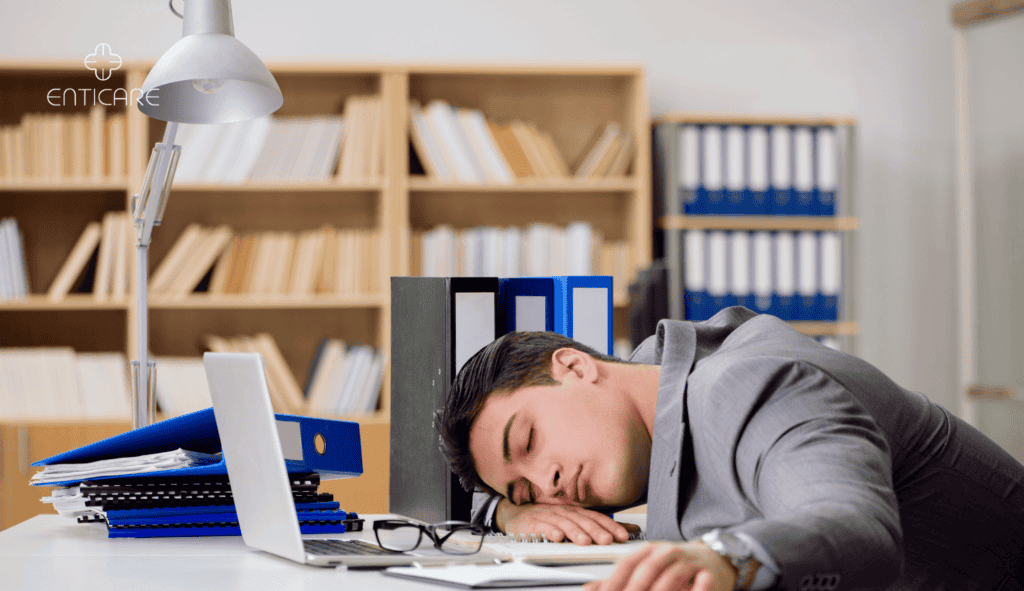Depression and hypersomnia are two closely linked conditions that affect millions of people worldwide. Idiopathic hypersomnia, a type of hypersomnia with unknown causes, also plays a significant role in this relationship. The excessive sleepiness that characterizes hypersomnia can worsen symptoms of depression, making it difficult to get through daily life. This post will dive deep into the relationship between these two conditions, how hypersomnia can signal depression, and what you can do to manage both effectively.
Understanding Hypersomnia: More Than Just Excessive Daytime Sleepiness

What is Hypersomnia?
Hypersomnia, also known as excessive daytime sleepiness (EDS), refers to excessive sleep or an overwhelming need to sleep during the day. People with hypersomnia often find it hard to stay awake and alert, which can significantly disrupt daily life. The multiple sleep latency test (MSLT) is a diagnostic tool used to measure sleep latency and assess the severity of hypersomnia.
Types of Hypersomnia
Hypersomnia can manifest in different ways:
- Primary hypersomnia occurs without any other medical condition.
- Secondary hypersomnia often results from other health issues, such as depression, sleep apnea, or chronic fatigue syndrome.
- Idiopathic hypersomnia is a type of hypersomnia with unknown causes, making it challenging to diagnose and treat. It can significantly impact a person’s daily life and mental health.
Symptoms of Hypersomnia
Recognizing the symptoms is crucial for diagnosis:
- Frequent daytime naps
- Difficulty waking up after long hours of sleep
- Persistent drowsiness even after sleeping
Identifying hypersomnia early is key to finding appropriate treatment.
The Link Between Hypersomnia and Depression
Hypersomnia as a Symptom of Depression
Hypersomnia is not just a sleep disorder; it can also serve as a warning sign of an underlying mental health issue. Many people suffering from depression experience hypersomnia as a core symptom, leading to prolonged sleep durations and excessive daytime fatigue. Depression can affect nighttime sleep quality, leading to hypersomnia. According to the DSM-5 (Diagnostic and Statistical Manual of Mental Disorders), hypersomnia is one of the key criteria for diagnosing depression.
How Depression Impacts Sleep
Depression affects neurotransmitters in the brain that regulate sleep patterns, including serotonin and dopamine. The result can be either insomnia (difficulty falling asleep) or hypersomnia (sleeping too much). Depression can also impact the quality of sleep, leading to feelings of fatigue despite extended rest. To better understand the relationship between depression and sleep, more thorough research methodologies, including the use of objective measurement tools, are needed to address the methodological and clinical aspects of this complex association.
The Vicious Cycle: Sleep and Mental Health
When hypersomnia and depression occur together, they can create a vicious cycle. Excessive sleep worsens feelings of lethargy and hopelessness, which fuels depression. In turn, the worsening of depressive symptoms encourages further oversleeping, creating a seemingly never-ending loop. Additionally, insufficient sleep syndrome can exacerbate depressive symptoms, creating another vicious cycle where self-imposed sleep restriction leads to excessive daytime sleepiness and further mood deterioration.
Comorbidities and Symptoms
Hypersomnia often doesn’t travel alone; it frequently coexists with other mental health disorders, including mood disorders, anxiety disorders, and attention deficit hyperactivity disorder (ADHD). Individuals grappling with hypersomnia may find themselves battling a range of symptoms that extend beyond just excessive daytime sleepiness. These can include difficulty concentrating, memory problems, and decreased productivity. Additionally, sleep-related symptoms such as sleep paralysis, sleep drunkenness, and even bouts of insomnia can further complicate their daily lives.
The presence of comorbidities like depression, anxiety, and substance abuse is not uncommon among those with hypersomnia. Research indicates that approximately 30% of individuals with hypersomnia also experience depression, while 20% struggle with anxiety. Substance abuse, particularly involving stimulants and sedatives, is also more prevalent in this group.
These comorbidities and symptoms can significantly impact an individual’s quality of life, affecting social relationships and performance at work or school. Therefore, it is crucial to diagnose and treat both hypersomnia and its associated conditions to enhance overall mental health and well-being.
Sleep Apnea: A Related Condition
Sleep apnea is a sleep disorder that can be intricately linked to hypersomnia. Characterized by repeated interruptions in breathing during sleep, sleep apnea leads to frequent awakenings and disrupted sleep patterns. This disruption often results in excessive daytime sleepiness, a hallmark symptom of hypersomnia.
Several factors can contribute to the development of sleep apnea, including obesity, smoking, and certain medical conditions. Additionally, sleep apnea can coexist with other sleep disorders like insomnia or restless leg syndrome, further complicating the sleep landscape.
Research indicates a strong connection between sleep apnea and depressive symptoms. The frequent interruptions in sleep caused by sleep apnea can disrupt the body’s natural sleep-wake cycle, leading to persistent fatigue, irritability, and anxiety. These symptoms can exacerbate existing mental health disorders or even contribute to their onset.
Moreover, sleep apnea can increase the risk of developing other sleep disorders, including hypersomnia. The constant sleep disruptions make it challenging to achieve restorative sleep, leading to difficulty falling asleep or staying asleep, and ultimately resulting in excessive daytime sleepiness.
Treatment for sleep apnea often involves lifestyle changes, such as weight loss and quitting smoking, which can significantly improve sleep quality. The use of a continuous positive airway pressure (CPAP) machine is another common treatment. This device helps keep the airways open during sleep, preventing the breathing pauses characteristic of sleep apnea.
In some cases, surgical interventions or oral appliances may be recommended to improve sleep quality and reduce the risk of developing other sleep disorders like hypersomnia. These treatments aim to restore normal breathing patterns during sleep, thereby enhancing overall sleep quality and reducing daytime sleepiness.
In summary, sleep apnea is a related condition that can significantly impact sleep quality and increase the risk of hypersomnia and other sleep disorders. If you experience symptoms of sleep apnea, seeking medical attention is crucial. Effective treatment can improve sleep quality, reduce excessive daytime sleepiness, and enhance overall mental health and well-being.
Diagnosing Hypersomnia
Diagnosing hypersomnia can be a complex process, as its symptoms often overlap with those of other sleep disorders like sleep apnea and insomnia. A thorough diagnostic evaluation is essential to pinpoint the underlying cause of hypersomnia and to differentiate it from other conditions.
Diagnostic Criteria
The Diagnostic and Statistical Manual of Mental Disorders (DSM-5) provides specific criteria for diagnosing hypersomnia. These include:
- Excessive daytime sleepiness, as indicated by a score of 10 or higher on the Epworth Sleepiness Scale (ESS).
- Prolonged sleep duration, typically 10 hours or more per day.
- Difficulty waking up in the morning, as evidenced by a high score on the Morningness-Eveningness Questionnaire (MEQ).
- The presence of one or more additional symptoms, such as sleep paralysis, sleep drunkenness, insomnia, or sleep-related hallucinations.
Differential Diagnosis
To accurately diagnose hypersomnia, it is crucial to rule out other sleep disorders and mental health conditions that may present similar symptoms. This differential diagnosis process may include evaluating for:
- Sleep apnea
- Insomnia
- Narcolepsy
- Restless leg syndrome
- Periodic limb movement disorder
- Depression
- Anxiety disorders
- Attention deficit hyperactivity disorder (ADHD)
A comprehensive evaluation helps ensure that the correct diagnosis is made, paving the way for effective treatment.
How to Recognize if Your Sleepiness is Linked to Depression
Sleep Patterns and Depression
While hypersomnia can result from various conditions, when combined with other depressive symptoms, it may point directly to depression. These symptoms may include:
- Persistent sadness or hopelessness
- Lack of interest in daily activities
- Difficulty concentrating
- Weight gain or loss
Monitoring sleep patterns and emotional well-being is essential for an accurate diagnosis. Additionally, assessing nighttime sleep quality and duration is crucial to understanding the relationship between sleep patterns and depression.
When to Seek Professional Help
If you’re experiencing excessive sleepiness alongside feelings of depression, seeking professional help is crucial. Idiopathic hypersomnia is a condition that may require professional diagnosis and treatment. A healthcare provider can help diagnose the issue, often by administering a sleep study or other assessments.
Understanding the Importance of Dual Diagnosis
For those suffering from both hypersomnia and depression, treatment must address both issues simultaneously. Ignoring one condition may cause treatment to fail, so recognizing the relationship between the two is vital for recovery.
Effective Treatments for Hypersomnia and Depression
Cognitive Behavioral Therapy (CBT)
CBT is one of the most effective treatments for both depression and hypersomnia. This therapeutic approach helps individuals recognize negative thought patterns and develop healthier coping mechanisms. CBT can be especially beneficial for those whose sleep issues stem from depression-related anxiety or stress. Additionally, CBT can help address sleep disturbances associated with depression and hypersomnia.
Medications
Several medications can treat both hypersomnia and depression. Antidepressants can balance neurotransmitters, improving mood and sleep regulation. Additionally, wake-promoting agents, such as modafinil, are prescribed to counteract daytime sleepiness. Medications can also be used to treat insufficient sleep syndrome, which may contribute to hypersomnia.
Lifestyle Changes
In conjunction with professional treatment, lifestyle adjustments can help manage symptoms:
- Sleep hygiene: Establishing a regular sleep routine can improve sleep quality, help improve the ability to fall asleep, and reduce hypersomnia.
- Exercise: Physical activity boosts mood-regulating hormones and improves overall energy levels.
- Diet: Consuming a healthy diet full of vitamins and nutrients can enhance both physical and mental well-being.
Preventing the Onset of Sleep Disorders and Depression

Understanding Your Sleep Needs
One of the most effective ways to prevent hypersomnia is to understand your personal sleep needs. The National Sleep Foundation recommends 7-9 hours of sleep for adults, but oversleeping beyond these limits can signal an underlying issue. Regularly monitoring sleep habits, particularly in times of emotional stress, can prevent hypersomnia from worsening depression symptoms. Additionally, preventing insufficient sleep syndrome, a condition characterized by excessive daytime sleepiness due to self-imposed sleep restriction can help reduce the risk of hypersomnia and depression.
Stress Management
Stress is a significant contributor to both depression and hypersomnia. Developing stress-management techniques, such as meditation, yoga, or deep-breathing exercises, can improve mental resilience and reduce excessive sleepiness.
Support Systems
A strong social support system plays an essential role in mental health. Engaging with family, friends, or support groups can reduce the feelings of isolation often associated with depression. Having someone to talk to about your sleep and emotional health can make a significant difference in the recovery process. Seeking support can also help address sleep disturbances associated with depression and hypersomnia.
Get the Help You Need Today
Hypersomnia and depression are complex conditions that can dramatically impact your quality of life, but you don’t have to suffer in silence. Early diagnosis and effective treatment can break the cycle of excessive sleep and depression, improving both mental and physical well-being. A multiple sleep latency test can be used to diagnose hypersomnia and guide treatment. Don’t wait—schedule an appointment with our team of specialists today to get the care you deserve.
Click here to schedule your appointment.
Conclusion
Hypersomnia is a multifaceted sleep disorder that can profoundly affect an individual’s quality of life, social interactions, and performance in work or school settings. The comorbidities and symptoms associated with hypersomnia can be challenging to diagnose and treat, but with a comprehensive diagnostic evaluation and a tailored treatment plan, significant improvements in overall mental health and well-being are achievable. Raising awareness about hypersomnia and its comorbidities is essential to promote early diagnosis and effective treatment, ultimately enhancing the lives of those affected.

